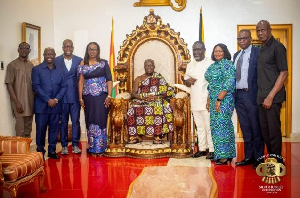- Home - News
- TWI News | TV
- Polls
- Year In Review
- News Archive
- Crime & Punishment
- Politics
- Regional
- Editorial
- Health
- Ghanaians Abroad
- Tabloid
- Africa
- Religion
- Election 2020
- Coronavirus
- News Videos | TV
- Photo Archives
- News Headlines
- Press Release
General News of Friday, 15 December 2006
Source: Statesman
Ghana’s ‘secret’ oil royalties
(Statesmans Version) MOSES Asaga, the NDC ranking member on energy, called on Government yesterday to divulge information about its "obscure” oil activities at Saltpond Field - which he says have been deliberately kept out of the public eye.
Over 600 barrels of oil have been produced at the offshore site every day since July 2004, he told Parliament, in a joint operation between the Ghana National Petroleum Corporation and Lushann Eternit Energy Limited, an American-owned company.
In an agreement signed between the two, the government of Ghana takes a 3 percent royalty on every barrel of oil sold. However, “this information has not been made available to the public,” Mr Asaga fumed afterwards in an interview with The Statesman.”
“I would like to know where the royalties are going – and why this has not been in the public domain… I challenge the Ministries of Energy and Finance to come out with details about this revenue, and why it is not accounted for in an oil revenue account.”
If oil has been in production for the past one-and-a-half years, details of this should have appeared in the 2006 budget, he said, suggesting that Government might instead be “diverting resources.”
Mr Asaga is now asking for a committee to investigate the matter, looking at how many barrels have been produced at the site, how much the revenue has been, and how this has been distributed and disbursed.
“If 700 barrels of oil have been produced daily since July 2004, there is $10.9 million in potential revenue which should have been coming back to Government. But where is this accounted for?” he asked The Statesman.
He described the response to his questions in Parliament yesterday as unsatisfactory:
“Nobody seems to know anything about an oil account. Everything was very blurred – it was as if they have something to hide. But I want to blow this whole issue up.”
“Even some on the government bench seemed surprised that this had been going on for a year and a half without their knowledge,” he went on, claiming “support” for an investigation into the matter.
The Deputy Minister of Energy, K T Hammond, has however come out to refute the claims, describing as “nonsense” the allegation that Government is unaware about where the 700 barrels, and the subsequent royalties, are ending up.
“I don't think this is proper politics,” he told The Statesman yesterday. “Politics must have some scruples; you simply don"t make some scandalous allegations, and think you’ll get away with it.”
“Who is shrouding this whole thing in secrecy?” he asked – suggesting that it was rather Mr Asaga who was trying to create the scandal.
As to the “unsatisfactory” response he and his colleagues were able to give in Parliament yesterday, “there are some points made in Parliament to which you can’t respond adequately. There were quite a few serious and to me mischievous arguments made in Parliament which needed full clarification.”
The Ghana National Petroleum Corporation has full and extensive figures about the output and revenue raised at the Saltpond site, he added – which Mr Asaga could have accessed.
Mr Hammond said the oil field had not consistently produced 700 barrels of oil since 2004 – rather, that they were now producing close to that figure, since the first quarter of 2006.
He produced a signed agreement between GNPC and Lushann Eternit Energy Limited in July 2004, which replaced an earlier agreement made between the former National Democratic Congress Government and Lushann in 2000. Under that agreement, “the Government of Ghana had nothing, there was no royalty agreement, there was nothing in it.”
When the NPP Government came in, “we thought that we would not allow them to have the field for free – so we put in place a proper agreement… which allows for a distribution of the proceeds.”
The 'confusion’ of Mr Asaga, he suggested, results more from his ill-informed stance than from the facts themselves. “I expect people to have read before they make an argument, based on fact.”
He pointed in particular to article 7.2 of the lengthy agreement document, which reads “All petroleum or monies accruing to the state under this Article should be delivered to an Appointed Government Agent, or paid into a Government Account designated by the Minister.”
The appointed Government agent was the Ministry of Finance, said Mr Hammond. “So what is this bank account he is talking about?”
Why did the figures not then appear in this year’s budget? The Statesman asked him.
“Has he [Mr Asaga] even read every page of the budget?” was Mr Hammond’s response, pointing out that, “not everything is itemised” in the budget and that the income could have been “embodied” elsewhere.
He spoke, too, about Lushann Eternit Energy Limited, a company which he says, “is in debt to the neck.” Government has been doing its best to sort a situation created for it by an earlier NDC agreement, he said, and any allegations to the contrary are simply “lies.”










